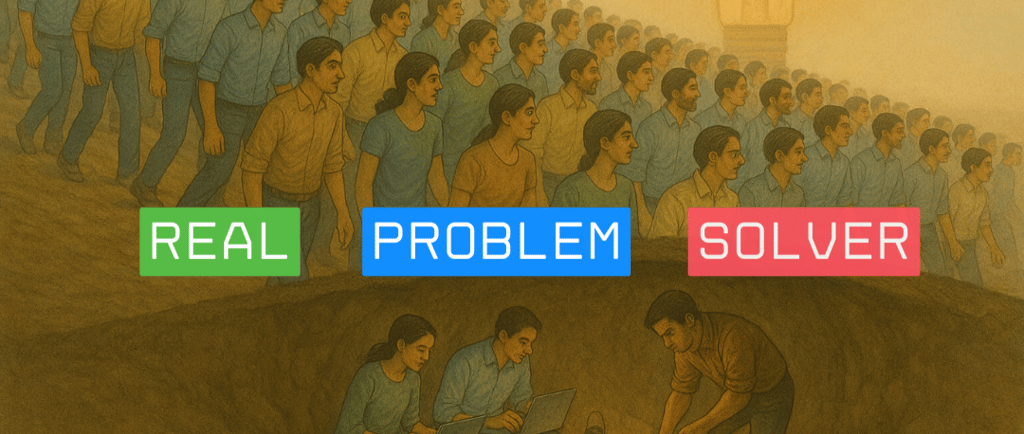Startups Are Everywhere — But So Is Sameness
Why Real Business Success Still Belongs to the Few Who Dare to Be a Monopoly
Shyjin Bhaskaran M
5/28/20257 min read


“Most startups are not founded to solve problems. They are born to ride waves. And waves disappear.” — An honest observation from the trenches
🚨 The Brutal Truth: Everyone’s Building Something — But It All Looks the Same
It’s never been easier to start.
Startup registration is up. Funding announcements are everywhere. AI tools are flying off the shelf. Instagram ads are flooded with “launching soon.” And even your dentist has a D2C side hustle now.
Welcome to 2025 — the golden age of starting up. In India alone, the Department for Promotion of Industry and Internal Trade (DPIIT) recognized over 1,17,254 startups as of December 31, 2023, a testament to this boom. But behind this golden curtain lies a problem no one wants to talk about:
Most startups are indistinguishable. And increasingly, unnecessary.
You can wrap it in fancy design. You can plug in ChatGPT. You can call it disruption.
But if you're solving what five others are already solving, in the exact same way, with no clear moat — You're not building a business. You're participating in a lottery.
🔹 A Flood of Ideas, But a Drought of Originality
Let’s look at what’s really happening:
Dozens of AI tools that do the exact same thing — just with a different font. Think of the surge in AI content writers or image generators that offer marginal differences.
D2C brands “inspired” by other D2C brands, selling yet another variation of skincare, candles, or kombucha. The Indian D2C market, projected to reach $100 billion by 2025, is ripe with examples of this "me-too" approach, where differentiation often comes down to packaging and influencer marketing rather than core product innovation.
SaaS platforms solving surface-level productivity issues — while deeper ops remain broken. Many focus on "digitizing" existing processes without fundamentally improving them.
Founders pitching “Uber for X” or “Airbnb for Y” without asking: Does the world need this? Or do I just need a deck? This often leads to a "solution looking for a problem" scenario.
In short: everyone is starting, but few are differentiating. This lack of genuine novelty often results in a race to the bottom on pricing and features, instead of a focus on unique value.
🧙️ Why Is This Happening?
Because the ecosystem now celebrates building more than solving.
You can ship in a weekend. Low-code/no-code platforms and readily available templates have drastically reduced the barrier to entry for launching an MVP.
You can raise on aesthetics. A polished pitch deck and a well-designed landing page can often secure early funding, even if the underlying business model is weak.
You can get 1,000 users without retention. The focus often shifts to user acquisition metrics for fundraising, overlooking the crucial aspect of sustained engagement and genuine need.
You can go viral without being valuable. Social media algorithms often reward novelty and controversy over substance, leading to fleeting attention rather than lasting impact.
And so… many do.
We’ve mistaken momentum for moats. We’ve confused features for value. We’ve celebrated hustle instead of depth.
In this age of abundance, scarcity has become one thing: real, useful originality.
🧠 What The Best Business Books Warned Us About
Let’s bring in some hard-earned wisdom from the icons:
“All truly successful businesses are monopolies.” — Peter Thiel, Zero to One (Thiel argues that competition destroys profits, while monopolies, by offering unique value, can capture substantial gains and innovate further.)
“Greatness is not a function of circumstance. Greatness, it turns out, is largely a matter of conscious choice.” — Jim Collins, Good to Great (Collins highlights how truly great companies make deliberate, disciplined choices to achieve superior performance, often by focusing on their unique strengths.)
“Don’t build something unless it solves a real problem, in a way no one else is solving it.” — Every credible operator, ever (This core principle of problem-solving is often overlooked in the rush to launch.)
So here’s the wake-up call:
The market doesn’t reward the next “nice to have.” It rewards the must-haves — the irreplaceables.
📊 Some Data to Ground This
To give the context a backbone:
India has 1.6 lakh+ registered startups (2024), with the total count of DPIIT-recognized startups exceeding 117,254 as of December 2023. This rapid growth signifies a vibrant entrepreneurial ecosystem.
In FY 2023–24, 1.85 lakh new companies were incorporated. This indicates a strong intent to start new ventures.
Tamil Nadu, Maharashtra, Karnataka, and Delhi are among the most active states for startup incorporation. Bengaluru, Delhi NCR, and Mumbai consistently lead in terms of startup density and funding.
Over ₹100 Cr+ has been deployed in early-stage innovation by state startup missions, demonstrating significant governmental and institutional support. The Indian government's Startup India initiative, for instance, has been instrumental in creating a supportive policy environment.
Yet over 90% of startups shut within 5 years — not due to lack of tech, but lack of traction and differentiation. A 2019 report by IBM estimated that 90% of Indian startups fail within the first five years, primarily due to lack of innovation, poor business models, and fierce competition. This alarming statistic underscores the core issue of sameness.
In short: it’s easy to start. It’s nearly impossible to stand out.
💡 So Then, What Actually Works?
Let’s flip the script now — because not all is doom.
There are businesses breaking the mold. There are founders building real monopolies. And they’re not chasing trends — they’re solving real, boring, profitable, and deep-rooted problems.
✅ They Solve Real Problems with Principles — Not Just Profit
Not every monopoly builder writes code.
Sometimes, a bakery can show more courage than a startup with $1M in seed.
Take a local bread maker — let’s call her Asha.
She’s surrounded by competition. Rows of mass-produced loaves at supermarkets. Breads with weeks-long shelf life. Labels filled with preservatives and numbers you can’t pronounce.
But Asha refuses.
“I won’t use artificial improvers or chemicals,” she says. “My breads may expire sooner, but I’ll make them better. And package them better.” “They’ll be real. And my customers will know the difference.”
She’s not scaling to a million units — yet.
But she’s building something most don’t: trust. A strong, authentic brand identity, even at a local level.
And that trust? Is the beginning of a monopoly.
Because when you offer something authentic in a world addicted to artifice, you stand out. You build quietly, but deeply. You don’t chase retention — you earn loyalty. This kind of loyalty is far more valuable than fleeting user numbers.
Her customers don’t just buy bread. They buy a philosophy. A relationship. A new normal.
This is the future of business:
Not more features. More meaning. Not more shelf life. More life in what’s offered.
In the noise of shiny MVPs and “AI-powered” everything, Asha’s bread is innovation. Not because it’s new tech — but because it’s true value.
✅ They Obsess Over One Thing Until It’s Unbeatable
Zerodha made investing simple, accessible, and delightful for young Indians. They didn't just build another brokerage; they focused on a minimalist UI, low-cost trading, and educational resources, becoming India's largest stockbroker by active clients.
Zoho quietly became India’s most profitable SaaS suite — without raising external capital. Their unique strategy of "rural product development" and a comprehensive suite of business applications allowed them to serve a wide range of customers globally, building a sustainable, profitable empire.
Notion didn’t build another doc tool — it redefined the idea of "workspace." By offering extreme flexibility and customization, Notion empowered users to build their own systems, fostering a highly engaged and loyal community.
Pick a wedge. Go deep. Go scary deep. This depth creates a defensible moat that is difficult for competitors to replicate.
✅ They Treat AI As Fuel, Not a Badge
Everyone’s adding AI. But few are bending it into their core workflow.
Real AI-driven startups:
Reduce ops cost by 90%. For example, AI in customer support can drastically cut down response times and agent workload, leading to significant cost savings.
Automate real decisions, not just summaries. Think of AI models that optimize supply chains, predict market trends with high accuracy, or personalize complex user experiences.
Use AI to do things humans can’t, not just faster typing. This includes complex data analysis, pattern recognition in vast datasets, or generating novel solutions that go beyond human cognitive limits.
Don't say “we use AI.” Say: “AI is why our product is 10x better.” This shifts the narrative from a mere feature to a fundamental differentiator.
✅ They Build Profit Into the Model, Not Later
In the post-2024 world, capital efficiency is not optional. The era of "growth at all costs" is rapidly receding.
Build for margins. Sustainable businesses prioritize healthy profit margins from the outset, rather than relying on future monetization strategies.
Price like a value-add, not a giveaway. Premium pricing can signal confidence in value and attract customers who are willing to pay for quality and unique solutions.
Avoid CAC traps that make you burn $1 to earn ₹0.30. Customer Acquisition Cost (CAC) must be carefully managed to ensure profitability. Relying heavily on expensive marketing channels without a strong LTV (Lifetime Value) is a recipe for failure.
Stop building businesses that rely on infinite VC burn. Investors are increasingly looking for a clear path to profitability and sustainable growth, not just hockey-stick user graphs.
Sustainability is sexy again.
🔮 What’s the Future of All This?
If this continues, we’ll have:
A long trail of “good-looking” startups with no usage. These will largely be the victims of the "sameness" problem.
A few truly verticalized, irreplaceable, cash-generating winners. These will be the monopolies that have carved out their unique niche.
An increasingly AI-driven core for every business function. AI will become a fundamental utility, not just a buzzword.
A market that rewards quiet builders over loud launchers. Substance will trump hype.
A culture shift: from MVPs to meaningful value propositions. The focus will shift from minimum viable product to maximum valuable impact.
In short:
The future will not belong to those who build fast. It will belong to those who build deep.
🤝 Your Takeaway as a Builder, Brand, or Designer
As a creator, strategist, founder, or marketer — ask yourself:
Am I solving something real? Is there a tangible problem I'm addressing, not just a perceived market gap?
Am I irreplaceable to even 10 people right now? Can these 10 people genuinely not live without my product/service?
If I disappeared, would anyone care? This is the ultimate litmus test for building something truly indispensable.
Am I building monopoly behaviors — or mimicking the market? Am I creating unique value or just iterating on existing ideas?
Because in this wave of startups, the goal is not just to surf. It’s to build the ocean floor.
💬 Let’s Talk: Are You Building Something That’ll Matter in 5 Years?
If you're building, advising, or investing — I’d love to hear:
What are you seeing in the startup ecosystem right now?
What product recently made you say, “Now this is different”?
Where do you think the next monopoly will emerge — and why?
Let’s shift the conversation from creation → to meaning. From building fast → to building forever.
